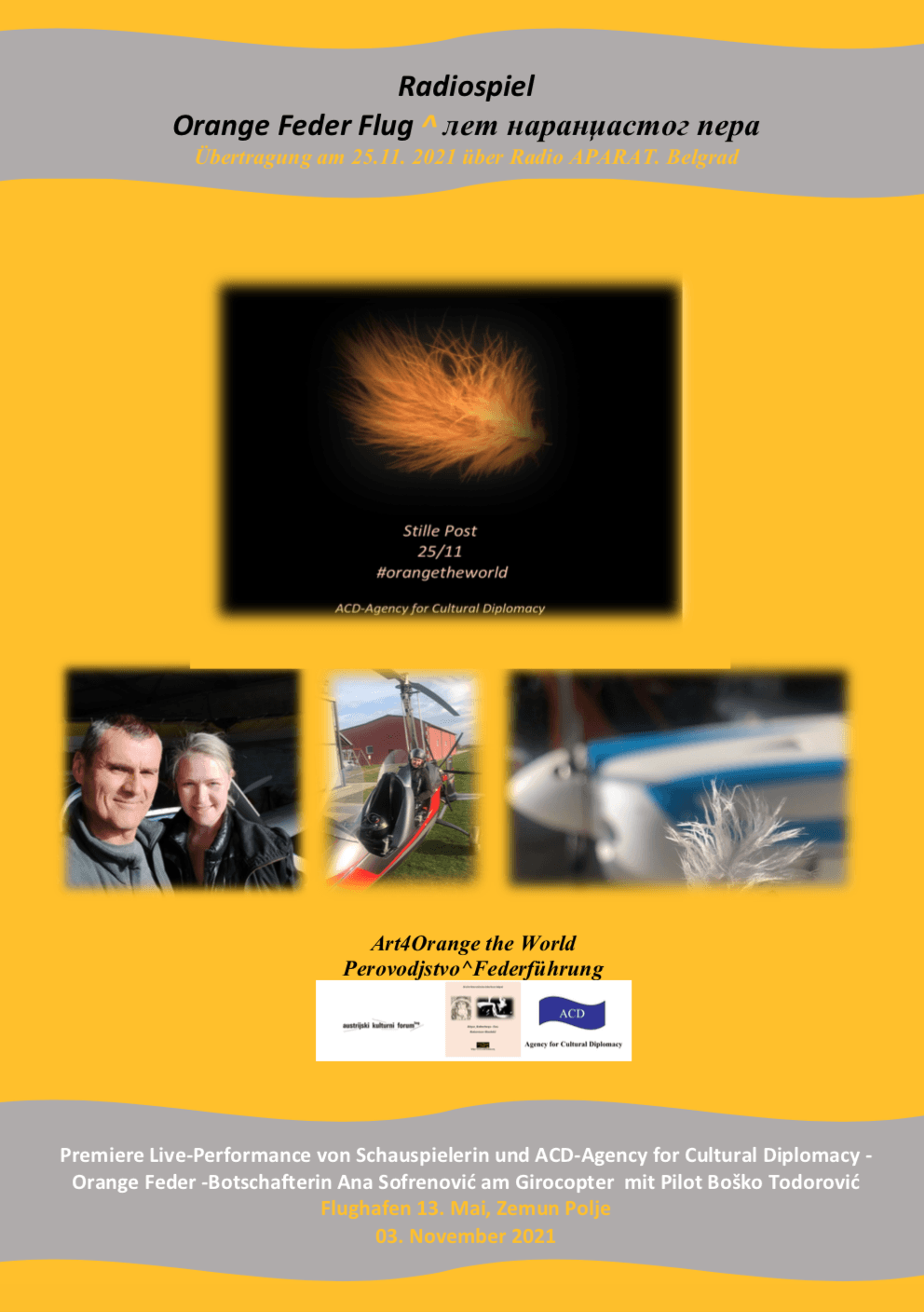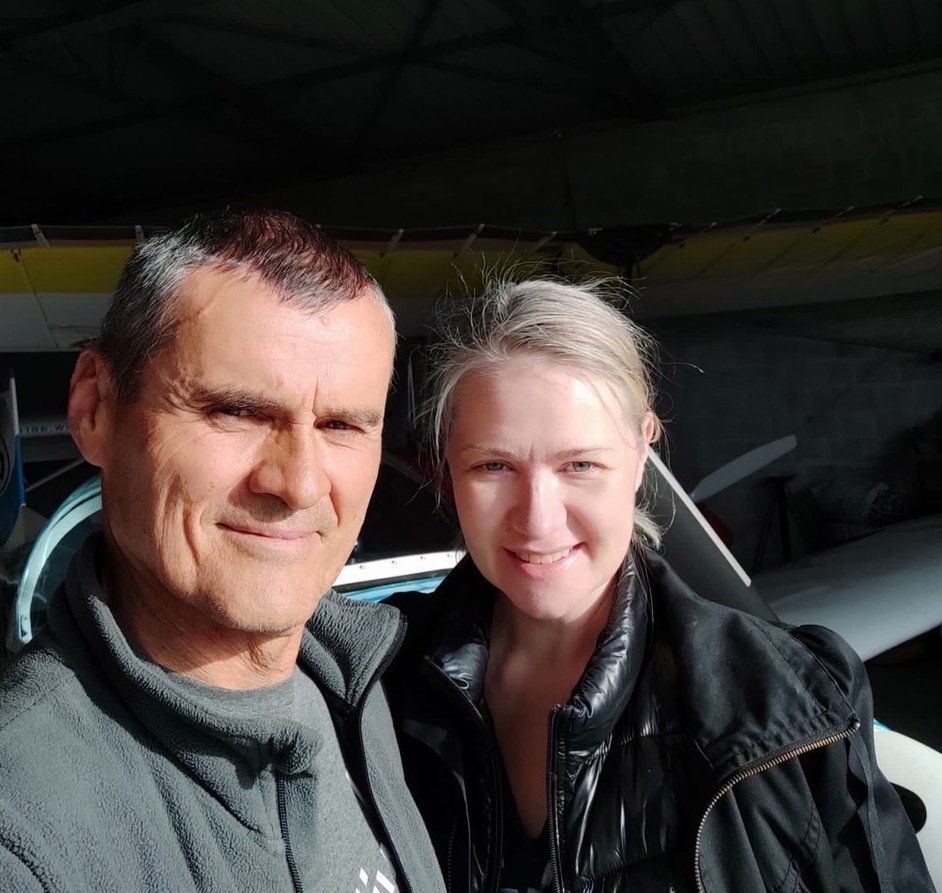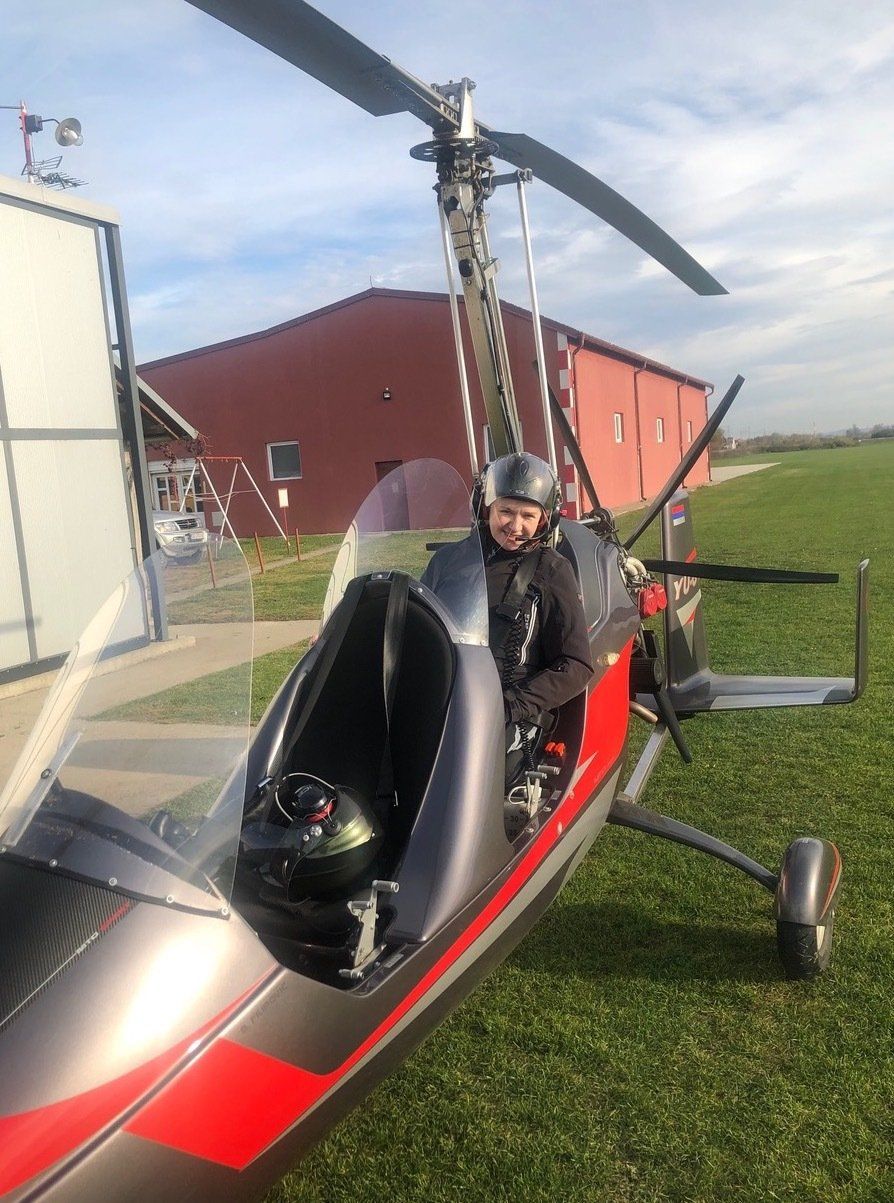Lehrstück (2.part)
The Federflug DX
Radio play
Here is the Feather[1]
Imagine being overcome by an oceanic rage!
Your body is frozen and stiffing in anger,
a chorus of thousand cicadas roar in your ears,
and your neck is stiff.
There is a needle-like pain in your right knee.
A hand cramps and becomes a fist.
An eyelash presses in the eyeball and the cheekbone trembles.
It's tingling in your feet, the ground is pressing.
Cvvrrrrčak …
Suddenly!
A feather flies towards your left eye
it's orange
It comes out of nowhere...
Perce.
Your breath vibrates.
Fingers move, arms stretched sideways, then move in waves.
Following feather, viewing the flight, an eyelash slides out of your right eyeball.
It flies with feather.
You fly with.
The flow of breath becomes gentle, the neck softens...
Cvrčak!
Trepavice titraju,
both hands cupped,
Here's the feahter
In Vienna, May 31, 2021. Tatjana Christelbauer
[1]
Name based on the “Here is the apparatus” composed by Kurt Weill for Bertolt Brecht’s teaching piece Ocean Flight. Explanations on the "Ocean Flight" In: Bertolt Brecht: Writings on literature and art. Volume I, Suhrkamp Verlag, pp. 128-131 = explanations for Lindberghflug: In: Large annotated Berlin and Frankfurt edition, volume 24, writings 4, Frankfurt am Main, 1992, pp. 87-89.
Introductory insights
Guided meditation, Radio play, ina - two language play -
based on Bertolt Brecht's radio theory and "Lehrstück" teaching act: Ocean flight.
The play introduces example on overcoming and coping with a threatening situation by guided meditation in a bilingual word play.
Emerging acts are experienced by listening of moderator/performer and following onomatopoeic impressions, imaginatively.
Federflug as a radio play becomes an (individual) stage play and at the same time a community experience. Oceanic fury is dealt with force of personified natural power.
In the onomatopoeic bilingual play, anger is repeatedly embodied and disembodied, alienated in terms, relocated, freely resolved.
"The exercise is effective by listening to moderator/performer, listening to ´self´, following appearing imaginative acts, becomeing ´outside or beside of the self´´.
"The Lehrstück teaches by being played, not by being seen."
In Brecht's radio theory[2] It says: "Ocean flight is of no value unless trained on it. It has no artistic value justifying a performance that is not the purpose of this training. It is a subject of study and is divided into two parts. One part (the chants of the elements, the choirs, the sounds of water and engines and so on) has the task of making the exercise possible, that is to say to initiate and interrupt it, which is best done with an apparatus. The other pedagogical part (the flying part) is the text for the exercise: the person practicing is the listener of one part of the text and the speaker of the other part. In this way, a collaboration between the apparatus and the practitioner develops, whereby accuracy is more important than expression. The text is to be spoken and sung mechanically, at the end of each line of verse is to be removed, the part heard is to be read along mechanically.”[3]
The alienation effect is used as an important stalk[4] used by bilingual game (Serbian-German and vv). In this way, the recipients should develop a critical dis-dance to the oceanic feeling of rage. The Feather acts as a co-playing figure that 'suddenly', 'out of nowhere' flies, moving the recipient out of a passive listening position and out of a state – while playing along.
Using a different language has far-reaching consequences: it influences perception and reactions to various phenomena. The researchers, including Albert Costa and Joanna Corey from Barcelona's Pompeu Fabra University, suggest that using a foreign language gives people some emotional distance and allows them to take more expedient actions.[5]
The didactic piece "Der Federflug" was created as part of the project cooperation with AKF Belgrade for the 20th anniversary of the Austrian Cultural Forum for my presentation Bodenwieser-Mandukic[6]
This first form will be further developed, the text will also be expanded with other languages and emotional landscapes.
Didactic reflections on the performative approach were based on the approach and didactic forms of mediation linked to the concept of the art of teaching by Martin Wagenschein. The performance character of the Lehrstück finds inspiration in the work and legacy of the legendary Serbian pilots and DJs-zAir Zoran Modli, a.o
First performance "Orange Feather Flight" was organized at Airfield May 13, Zemun Polje near Belgrade in Serbia in cooperation with pilot Bosko Todorovic and his team. The recordings on a gyrocopter were made via the radar control.
Media promotion: blog article on Aviatica-online magazine
Broadcast of the lesson "Orange Federflug" via OKTO community TV
References:
[1]
Borrowed in:
http://gesellschaftfuertheaterpaedagogik.net/pages/lehrstueck.php
[2] See broadcasting as a communication apparatus. In: Bertolt Brecht: Collected works in 20 volumes. Volume 18, Frankfurt am Main, pp. 127-134 = Large annotated Berlin and Frankfurt edition, Volume 21, writings 1, Frankfurt am Main, 1992, pp. 552-557
[3] See in: http://www.xn--hrdat-jua.de/select.php?S=0&col1=au.an&a=Brecht&bool1=and&col2=ti&b=Lindberghflug
[4] Based on the V-Effect by Bertolt Brecht. 'This is intended to prevent recipients from identifying with the characters in the game, so that the recipients can develop a critical distance and their own judgment.'
"Listeners should become players", and: "Radio becomes speaker and medium in one: it communicates with the listeners ("the Lindberghs")" Author's note. Cf. in: https://web.archive.org/web/20150928143721/http://schauspiel-zentrum.de/wordpress/wp-content/uploads/2013/02/B.-Brecht-Theorie-historische-Umsetzung-und-Kritik -der-Lehrstücke.pdf p. 13
[5] In my practical research on the influences of various languages on cognition and emotion, movement and action, I developed such multilingual exercises and presented them to children and adults in interactive workshops. More on this: https://www.tatjana-christelbauer.com/sprachenweb In further research I also found similar studies: “Thinking More or Feeling Less? Explaining the Foreign-Language Effect on Moral Judgment,” Sayuri Hayakawa, David Tannenbaum, Albert Costa, Joanna D. Corey and Boaz Keysar, Psychological Science, Aug. 14, 2017. DOI: 10.1177/0956797617720944
[6]
Web link to the webpage with information on the 2017 project, which was further developed this year.
https://www.acdvienna.org/acd-dance-arts/wienmoderndance/bodenwieser-mandukic/







